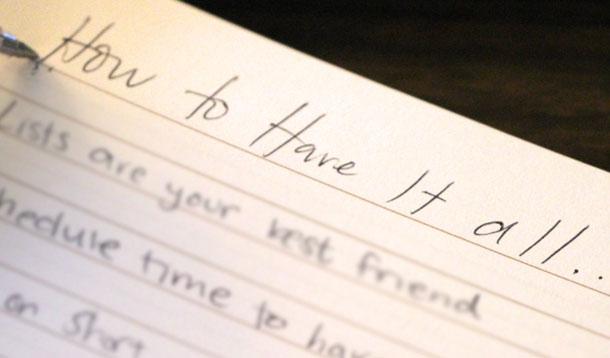
There are tons of books out right now on how women can “have it all.” It is interesting to note, however, that there are quite a few renowned women (Oprah, Madeline Albright, Anne Marie Slaughter, Sheryl Sandberg) who have articulated that while no one can have it all at once, they can have different things at different times in life. What I have found is we’ve spent a lot of time trying to find a way to make this phrase fit all women, with the result being that women end up arguing with each other. For example, I have read many negative reactions to Sheryl Sandberg’s Lean In stance; however, I feel if she (and the many women with whom this message resonates) loves to lean in, then there should be space for her message.
Let’s really consider what the phrase is saying What does it mean to “have it all”? The conventional description likely includes: a perfect marriage, well-behaved high-achieving children, a fulfilling career, a wonderful social life, an abundance of money, and looking and feeling great. Here’s the thing, everything that is on this list requires dedication and work . . . hard work! So, although many women would ideally like all of these things, I don’t think any women has the capacity to work enough to get all of these things at one time. Don’t get me wrong, I’m a believer in hard work, but it has to be hard work with a genuine purpose. "Having it all” likely isn’t something that women see as their intrinsic purpose in life. Instead, it is something we would want as a status symbol, to be approved by society. Beyond that, I think if I were able to work for all of these achievements, and actually obtain them, I’m not sure I’d have the energy to enjoy them. I’m sure you would agree.
My stance on this topic is—you don’t have to want it all! Instead, have what you love and love what you have. Simple as that. Let’s look at some common threads in our lives where this could apply. We can love our partner, who may at times be over-stressed or oblivious to our needs, but who loves and respects us for who we are. We can love our children, rambunctious, quirky, and gifted with selective hearing. Many of us are fortunate enough to love the work we do, even though there are aspects we don’t enjoy or may not be good at, and we don’t always get appropriately compensated for it. We can love our friends, those we see regularly, and those we only manage to connect with after way too long. We can love that we have enough money to live comfortably and to share with those in need. And we can love that we have the energy to wake up each morning and make ourselves look attractive even though we might not look or feel like a supermodel or an athlete.
So, you may ask, how does one have what they love? Well, in one word: prioritize. Prioritize your things, your duties, your goals—your life. Make sure you are putting more effort into those things that are higher in your priorities, and less effort into things that rank lower.
And how does one love what they have? In one word: gratitude. When we have gratitude for the higher priorities, we acknowledge that we already have so much. We remind ourselves not to take what we already have for granted, so we can appreciate and enjoy those things that were meant to bring us joy. If we have this appreciation, we wouldn't spend so much time looking for happiness elsewhere.
I know that having it all is not for everyone, and I also acknowledge that the things I want in my life may not be what every woman wants either. Each person is different. What do you love that you don’t have in your life right now? What do you already have that you have neglected loving lately?
Six steps to creating a basic to-do list that will help you prioritize and get a handle on what you have to do.
And find out how to teach children about gratitude.